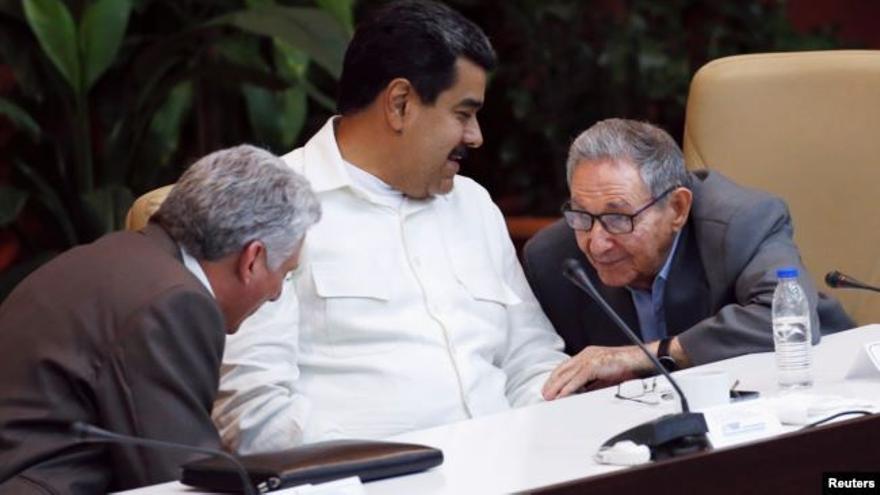
![]() 14ymedio, María Werlau, Washington, 20 October 2019 — A recent report on Venezuela by the UN High Commissioner for Human Rights confirmed the Chavista strategy to neutralize, repress, and criminalize opposition and dissent. It also reports on the militarization of State institutions, restrictions on democratic space, dismantling of institutional checks and balances, the shrinking space for independent media, patterns of grave human rights violations as well as extensive extrajudicial killings, arbitrary detentions. and other abuses.
14ymedio, María Werlau, Washington, 20 October 2019 — A recent report on Venezuela by the UN High Commissioner for Human Rights confirmed the Chavista strategy to neutralize, repress, and criminalize opposition and dissent. It also reports on the militarization of State institutions, restrictions on democratic space, dismantling of institutional checks and balances, the shrinking space for independent media, patterns of grave human rights violations as well as extensive extrajudicial killings, arbitrary detentions. and other abuses.
The deepening economic and humanitarian crisis in Venezuela is constantly in the news. At least 87% of Venezuelans now live in poverty, social services have collapsed and people go hungry and die in hospitals for lack of supplies. More than 4 million Venezuelans have fled and the mass exodus continues.
This devastation in Venezuela results from the progressive transfer of Cuba’s socio-political and economic “revolutionary” template to Venezuela. It stems from a comprehensive integration plan forged by Hugo Chávez and Fidel Castro of an ideological, political, military, security, economic, judicial, and socio-cultural nature that also encompasses information and communications. Unbeknownst to the Venezuelans, Cuba had plotted for decades to secure the dominating role.
Venezuela also adopted the Cuban prototype of socialism that imposed poverty on the people through centrally-planned “social” ownership of the means of production and distribution but with a captive capitalism (so-called “state capitalism”) for the exclusive enjoyment of the elite in power. However, the Venezuelan “Bolivarians” have brought plunder and ostentation to its maximum expression, likely beyond any historical precedent.
The investigation, with 800 bibliographic sources, describes how Cuba has essentially occupied Venezuela not with a traditional military force but by asymmetric means, strategically placing assets to control its economy, security forces, information, communications, and society in general.
It’s impossible to know from open sources how many Cubans are in Venezuela at the service of their government — many have passed no migration controls and pose as Venezuelans — but Cuban official sources (although never reliable) have reported around 46,000 Cuban “collaborators” there working on “more than 200 projects,” 21,500 of which are in the health sector.
That would officially leave at least 24,500 in unspecified capacities (most would presumably be in a security or military capacity). Other sources believe the number is much larger. However, the measure of Cuba’s role is not in the number of Cubans in Venezuela, it is in the influential and wide-ranging controlling roles they have in all of Venezuelan society, exerted both inside Venezuela and, importantly, from Cuba.
My study attributes Cuba’s colonization of the much larger and richer Venezuela to the Cuban military regime’s competencies or comparative advantages, enabled by the totalitarian nature of the system. Cuba’s intelligence and propaganda apparatus is formidable. In addition, the State exploits its citizens with no restraints or checks and balances through forced migration and as exported or expatriate workers (through a huge business of trafficking in persons), also engaging in transnational criminal activities.
The Cuba-Venezuela integration is part of a continental plan and is sustained by shared international criminal networks. This alliance, akin to conjoined mafia states, is involved in drug trafficking, illegal mining, money laundering, and other illegal activities in conjunction with transnational actors that are enemies of liberal democracy and share nefarious interests: states such as Iran, China, and Russia, and non-state actors such as Mexican and Colombian drug cartels, Russian mafias, Hezbollah, ELN and FARC.
This situation not only affects the citizens of both Venezuela and Cuba but also poses grave security threats, especially to the region.
Cuba’s intervention in Venezuela: A Strategic Occupation with Global Implications is available here in English
______________
The 14ymedio team is committed to practicing serious journalism that reflects Cuba’s reality in all its depth. Thank you for joining us on this long journey. We invite you to continue supporting us by now becoming a member of 14ymedio. Together we can continue transforming journalism in Cuba.
